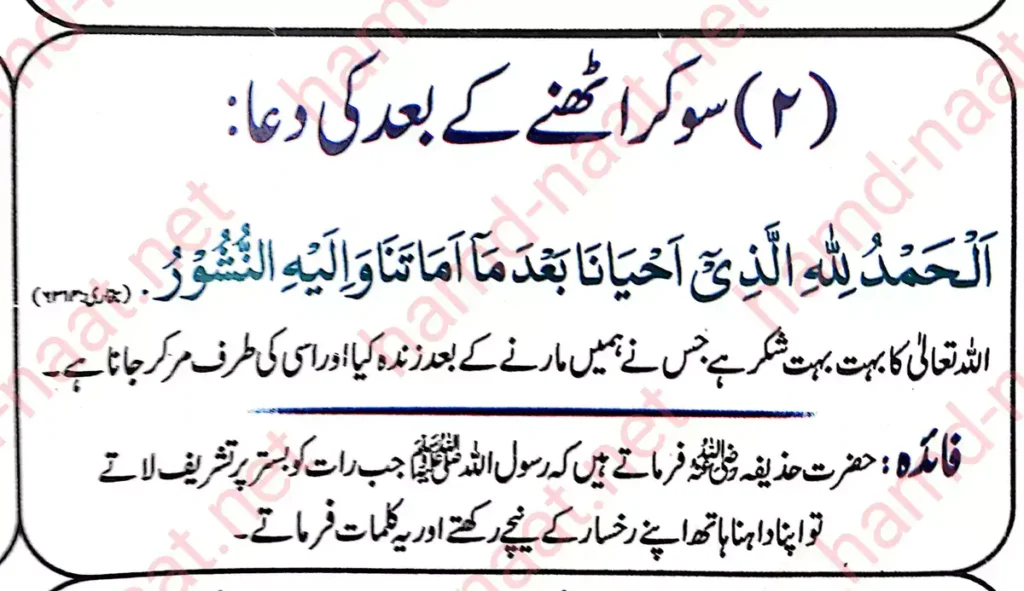Introduction:
As dawn breaks and light infiltrates your room, it’s an invitation to embrace gratitude for the dawn of a new day. In the Islamic tradition, this gratitude is beautifully encapsulated in the practice of reciting the Subah Uthne Ki Dua, a heartfelt supplication upon waking up. Let’s delve deeper into this practice and explore its significance in fostering a positive mindset and spiritual connection.
Understanding Subah Uthne Ki Dua:
This Dua, also known as the Supplication upon Waking Up, holds a sacred place in Islamic tradition as Muslims recite it upon awakening from sleep. It profoundly expresses gratitude to Allah (SWT) for restoring life after the temporary state of sleep, metaphorically likened to a form of death. Its essence resonates through its Arabic text:
بِسْمِ اللَّهِ الرَّحْمَنِ الرَّحِيمِ
Arabic Text:
اَلْحَمْدُلِلّٰہِ الَّذِیْ اَحْیَانَا بَعْدَ مَااَمَاتَنَا وَاِلَیْہِ النُّشُوْرُ
Translation:
[All Praise is due to Allah, who has Given us life after causing us to die, and to him is the resurrection.]
یااللہ تغالی،کا بہت بہت شکر ہے۔کہ جس نے مرنے کے بعد زندہ کیا،اور اسی کی طرف مرکرجانا ہے۔
اٹھنے کے وقت پڑھی جانے والی دعا جو اسلامی روایات کے مطابق سونے سے اٹھنے کی ابتدائی کاروائی کے دوران پڑھی جاتی ہے
.اس دعا میں اللہ کی نام کی برکت سے شروع کی جاتی ہے اور اللہ سے حفاظت اور سکون کی دعا کی جاتی ہے
.تاکہ شخص نئے دن کی ابتدائی کاروائی کو اللہ کی حفاظت اور رحمت سے آغاز کر سکے

Significance of Subah Uthne Ki Dua:
Beyond being a mere expression of gratitude, this Dua holds profound significance:
- Acknowledgment of Divine Power: It acknowledges Allah’s (SWT) sovereignty and power in granting life anew each morning, emphasizing our dependence on Him.
- Setting a Positive Tone: By commencing the day with gratitude and remembrance of Allah (SWT), it sets a positive tone, inviting blessings and optimism into our lives.
- Reminder of Spiritual Purpose: The dua subtly reminds us of our ultimate purpose and accountability, invoking contemplation on the transient nature of life and the importance of spiritual preparation.
Maximizing the Impact of Subah Uthne Ki Dua:
To amplify the significance of Subah Uthne Ki Dua, consider these practices:
- Mindful Recitation: Rather than rushing through the words, recite the dua with mindfulness, reflecting on its meaning and feeling genuine gratitude in your heart.
- Integration with Action: Let the dua serve as a catalyst for action. Channel the renewed energy and gratitude into performing good deeds and fulfilling your responsibilities.
- Cultivating Consistency: Establish a habitual practice of reciting this Dua upon awakening. Consistency reinforces gratitude, fostering a deeper connection with Allah (SWT) and nurturing a positive mindset.
Dua after Waking up video:
Conclusion:
As the sun rises each morning, let us seize the opportunity to embrace gratitude through the recitation of this Dua. In cultivating a mindset of thankfulness and spiritual connection, we pave the way for a day filled with blessings, positivity, and purposeful action. Let Subah Uthne Ki Dua be not just a ritual, but a transformative practice that enriches our lives and deepens our relationship with the Divine.
| Good Morning Dua in English |
| The Power of Sone Ki Dua for Restful Sleep |
| Dua After Azan (Call to Prayer, Islam) |
| A Guide to Good Morning Dua in Urdu |
FAQs:
Reciting This Dua upon waking up holds deep spiritual significance in Islam. It expresses gratitude to Allah (SWT) for the restoration of life after sleep, acknowledging His power and sovereignty. Additionally, it sets a positive tone for the day and serves as a reminder of our ultimate purpose and accountability.
Subah Uthne Ki Dua should be recited immediately upon waking up from sleep, before engaging in any other activity. It is encouraged to recite it with sincerity and mindfulness, reflecting on its meaning and feeling genuine gratitude in the heart.
While This Dua is traditionally recited in Arabic, Muslims can recite it in any language they understand. The essence of the supplication lies in expressing gratitude to Allah (SWT) for the gift of a new day and the restoration of life after sleep, regardless of the language used.



